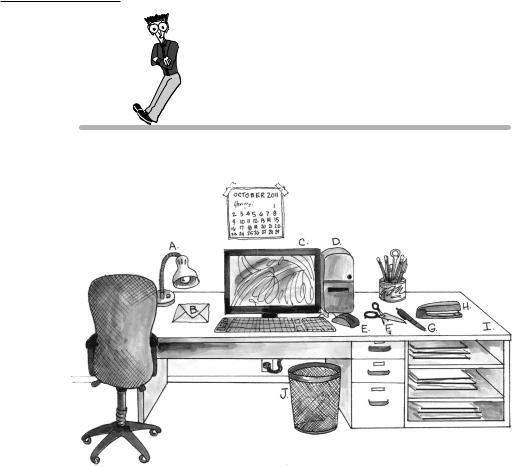
- •About the Authors
- •Dedication
- •Acknowledgments
- •Table of Contents
- •Introduction
- •About This Book
- •Conventions Used in This Book
- •Foolish Assumptions
- •How This Book Is Organized
- •Icons Used in This Book
- •Where to Go from Here
- •The French You’re Familiar With
- •Idioms and Popular Expressions
- •Key Parts of Speech
- •Cavorting with Verbs
- •Forming Sentences and Questions
- •The French Alphabet
- •Uttering Vowel and Consonant Sounds
- •Greetings: Formal and Friendly
- •Asking Questions to Get to Know People
- •Counting Your Lucky Stars: Numbers
- •Using the Calendar and Dates
- •Telling Time in French
- •Discussing Where You Live with the Verb “Habiter”
- •Discussing Daily Routine with Reflexive Verbs
- •Using Possessive Adjectives to Introduce Your Family Members
- •Basic Questions and Polite Expressions
- •Stating Your Preferences
- •Talking about Your Livelihood
- •Chatting about the Weather
- •Deciding to Keep in Touch
- •Getting Direction about Directions
- •Dining Out
- •Going to the Market
- •Going Shopping
- •Going Out with the Verb “Sortir”
- •Having Fun with the Verb “S’amuser”
- •Oh, the Places You’ll Go!
- •Making Plans with Friends
- •Making a Phone Call
- •Livin’ in the Past: Using the Past Tense
- •Playing Sports and Games
- •Going to the Beach
- •Setting Up Camp
- •Enjoying Quieter Pursuits
- •Where Do You Want to Go?
- •Getting Ready for Your Trip
- •Getting Current with Currency
- •Going to the Bank
- •Using Credit Cards and ATMs
- •Getting through the Airport
- •Navigating Buses, Trains, and Subways
- •Getting Around by Car
- •Finding Accommodations
- •Checking In to a Hotel
- •Checking Out of a Hotel
- •Getting Help Fast
- •Getting Medical Help
- •Handling Legal Matters
- •Label the Things in Your House
- •Write Your Shopping Lists in French
- •Listen to French Music
- •Watch French Movies
- •Tune in to TV5
- •Read French Publications
- •Take a Class
- •Join a French Association
- •Join an Online Chat or Pen Pal Forum
- •Using “Tu” When You Mean “Vous”
- •Using “Bonne nuit!” for Good-Bye
- •Using “Garçon” or “Porteur” to Address Service Staff
- •Saying “Je suis excité(e)” to Indicate Excitement
- •Saying “Je suis chaud(e)/froid(e)” to Say You’re Hot or Cold
- •Saying “Je suis plein/e” to Mean You’re Full
- •Using “de la glace” to Request Ice
- •Using “Je suis . . . ans” to Tell Your Age
- •Asking for Change with “J’ai besoin de change”
- •Using the Verb “Visiter” in Reference to People
- •“À mon avis”
- •“C’est pas vrai”
- •“Avec plaisir”
- •“C’est génial”
- •“À votre santé”
- •“À vos souhaits”
- •“Quelle horreur!”
- •“À bientôt”
- •“Passez-moi un coup de fil!”
- •“On y va!” or “Allons-y!”
- •“Je n’en sais rien”
- •“Je n’en reviens pas”
- •“Ça vaut la peine”
- •“C’est pas grave”
- •“N’importe”
- •“Tu cherches midi à 14h”
- •“Prenons un pot!”
- •Regular French Verbs
- •Auxiliary French Verbs
- •Track Listing
- •Customer Care
- •Index

180 Part II: French in Action
Words to Know
. . . à l’appareil |
. . . ah lah-pah-rehy |
This is . . . |
|
|
calling |
Passez-moi. . . |
pah-sey mwah. . . |
Transfer me |
|
|
to. . . |
un instant |
uhN-naN-stahN |
one minute |
Ne raccrochez pas/ |
nuh rah-kroh-shey |
Don’t hang up |
ne quittez pas |
pah/nuh kee-tey pah |
|
Il est/n’est pas dans |
eel eh/neh pah dahN |
He’s in/out of |
son bureau |
sohN bew-roh |
his office |
Je vous le/la passe |
zhuh vooh luh/lah |
I’ll transfer |
|
pahs |
you to him/her |
Je consulte mon |
zhuh kohN-sewlt |
I’ll check my |
calendrier |
mohN kah-lahN- |
calendar |
|
dree-yey |
|
Je suis libre . . . |
zhuh swee lee- |
I’m free . . . |
|
bruh. . . |
|
un rendez-vous |
uhN rahN-dey-vooh |
an |
|
|
appointment |
Making a Phone Call
Whether you’re visiting France, Canada, or any other francophone country, making phone calls is much easier than it used to be. Most people now have un mobile/un portable (uhN moh-beel/uhN pohr-tah-bluh) (a cell phone).
Just in case, there are some public pay phones in France that take une télécarte (ewn tey-ley-kahrt) (a calling card). Because of cell phones, however, the number of public phones has decreased dramatically.
www.ATIBOOK.ir

Chapter 11: Taking Care of Business and Telecommunicating 181
In France, most families have one phone line and only one or two phones. The phone is usually in the living room, with an extension either in the den or master bedroom. Very rarely do you find a phone in the kitchen. When calling someone’s residence, keep in mind that calling before 8:00 a.m. and after 8:00
p.m. is usually for emergencies, unless the person is expecting your call. Avoid calling during lunch and dinner hours because doing so is considered impolite.
French has two words for hello. You use allô (ah-loh) when answering the telephone and bonjour (bohN-zhoohr) when greeting people elsewhere. Also, in French, a telephone says dring, dring (dreen, dreen), not ring, ring.
Talkin’ the Talk
Pierre is calling to tell Monique what time the movie starts.
Monique’s mother, Mme. La Grange, answers the phone. (Track 11)
Mme. La Grange: |
Allô? |
|
ah-loh? |
|
Hello? |
Pierre: |
Bonjour madame. C’est Pierre. |
|
bohN-zhoohr mah-dahm. seh pyehr. |
|
Hello Ma’am. It’s Pierre. |
Mme. La Grange: |
Oui, Pierre. Ça va? |
|
wee, pyehr. sah vah? |
|
Yes, Pierre. How are you? |
Pierre: |
Ça va bien. Est-ce que Monique est là? |
|
sah vah byaN. ehs-kuh moh-neek eh lah? |
|
I’m fine. Is Monique there? |
Mme. La Grange: |
Oui, un moment, s’il te plaît. Ne raccroche pas. |
|
wee, uhN moh-mahN, seel tuh pleh. nuh rah- |
|
krohsh pah. |
|
Yes, just a minute. Don’t hang up. |
Monique: |
Allô, Pierre? |
|
ah-loh, pyehr? |
|
Hello, Pierre? |
Pierre: |
Monique, le film commence à 18h (heures). |
|
moh-neek, luh feelm kohh-mahNs ah |
|
deez-weet-uhr. |
|
Monique, the movie starts at 6:00 p.m. |
www.ATIBOOK.ir

182 Part II: French in Action
Monique: C’est super! À bientôt.
seh sew-pehr! ah byaN-toh.
Super! I’ll see you later.
Pierre: Au revoir. À bientôt. ohr-vwahr. ah byaN-toh.
Good-bye. See you later.
Words to Know
Est-ce que . . . est là? |
ehs-kuh. . . eh lah? |
Is. . . there? |
un moment, s’il |
uhN moh-mahN seel |
one minute |
te plaît |
tuh pleh |
please |
ne raccroche pas/ne |
nuh rah-krohsh pah/ |
don’t hang |
quitte pas |
nuh keet pah |
up |
à bientôt |
ah byaN-toh |
see you later |
Did you notice the informal tone of the preceding conversation? That’s because it was between people who are well acquainted with each other. Had Pierre and Monique been strangers, the conversation would have been more formal. Go to Chapter 2 for more about informal versus formal forms of address.
Many times, the person you’re trying to reach is not available. In that case, you can leave a message on un répondeur (uhN rey-pohN-duhr) (an answering machine) or in person.
Livin’ in the Past: Using the Past Tense
In French, you form the past tense, le passé composé (luh pah-sey kohN- poh-zey), by conjugating the helping verb, called an auxiliary verb, in the present tense and adding a past participle. The two auxiliary verbs are avoir (ahv-wahr) (to have) and être (eh-truh) (to be). Most verbs use avoir; a small percentage use être.
www.ATIBOOK.ir

Chapter 11: Taking Care of Business and Telecommunicating 183
Creating the past tense with “avoir”
Here’s the conjugation of avoir (to have) in the present tense:
Conjugation |
Pronunciation |
j’ai |
zhey |
tu as |
tew ah |
il/elle/on a |
eel/ehl/ohN ah |
nous avons |
nooh-zah-vohN |
vous avez |
vooh-zah-vey |
ils/elles ont |
eel-/ehl-zohN |
You make regular past participles from the infinitive of the verbs:
The past participle for –er verbs ends in é; just drop the r of the infinitive and add un accent aigu (uhN-nahk-sahN-tey-gew) (an acute accent) to the e.
•téléphoner (tey-ley-fohh-ney) (to telephone or call): J’ai téléphoné à Monique. (zhey tey-ley-fohh-ney ah moh-neek.) (I called Monique.)
•laisser (leh-sey) (to leave): Nous avons laissé un message.
(nooh-zah-vohN leh-sey uhN meh-sahzh.) (We left a message.)
The past participle for -ir verbs ends in i; just drop the r from the infinitive.
•choisir (shwah-zeer) (to choose): Il a choisi un mot de passe.
(eel ah shwah-zee uhN moh duh pahs.) (He chose a password.)
•finir (fee-neer) (to finish): Elles ont fini leur conversation.
(ehl-zohN fee-nee luhr kohN-vehr-sah-syohN.) (They finished their conversation.)
The past participle for -re verbs ends in u; drop the re from the infinitive and add a u.
•attendre (ah-tahN-druh) (to wait, to wait for): Tu as attendu le bus.
(tew ah ah-tahN-dew luh bewhs.) (You waited for the bus.)
•répondre (rey-pohN-druh) (to answer): Vous avez répondu à la question. (vooh-zah-vey rey-pohN-dew ah lah kehs-tyohN.) (You answered the question.)
French also has several irregular past participles. The irregular verbs don’t have a set pattern like the regular verbs do, so you just have to memorize them. Table 11-1 lists the most common irregular past participles.
www.ATIBOOK.ir

184 Part II: French in Action
Table 11-1 |
Common Irregular Past Participles |
|
Infinitive |
Past |
Example |
|
Participle |
|
être (eh-truh) |
été (ey-tey) |
Nous avons été en retard. (nooh-zah-vohN- |
(to be) |
|
zey-tey ahN reh-tahr.) (We were late.) |
avoir (ahv-wahr) |
eu (ew) |
Il a eu un message. (eel ah ew uhN mey- |
(to have) |
|
sahzh.) (He had a message.) |
faire (fehr) (to |
fait (feh) |
Qu’est-ce que tu as fait? (kehs-kuh tew ah |
do, to make) |
|
feh?) (What did you do?) |
voir (vwahr) |
vu (vew) |
J’ai vu le directeur (zhey vew luh dee- |
(to see) |
|
rehk-tuhr.) (I saw the director, manager.) |
pouvoir (pooh- |
pu (pew) |
Vous avez pu téléphoner à votre bureau. |
vwahr) (to be |
|
(vooh-zah-vey pew tey-ley-fohh-ney ah |
able to) |
|
vohh-truh bew-roh.) (You were able to call |
|
|
your office.) |
vouloir (vooh- |
voulu (vooh- |
J’ai voulu un rendez-vous (zhey vooh-lew |
lwahr) (to wish, |
lew) |
uhN rahN-dey-vooh.) (I wanted an |
to want) |
|
appointment.) |
prendre (prahN- |
pris (pree) |
Ils ont pris l’avion. (eel-zohN pree lah- |
druh) (to take) |
|
vyohN.) (They took the plane.) |
Using the past tense with être
A few verbs are conjugated with the auxiliary verb être instead of avoir.
Most of these are verbs of motion, such as
aller (ah-ley) (to go)
arriver (ah-ree-vey) (to arrive)
descendre (dey-sahN-druh) (to go down, to get off)
devenir (duh-vuh-neer) (to become)
entrer (ahN-trey) (to enter)
monter (mohN-tey) (to go up, to climb, to get on)
mourir (mooh-reer) (to die)
naître (neh-truh) (to be born)
partir (pahr-teer) (to leave)
passer (pah-sey) (to pass [by])
rentrer (rahN-trey) (to return, to go home)
www.ATIBOOK.ir

Chapter 11: Taking Care of Business and Telecommunicating 185
rester (rehs-tey) (to stay)
retourner (ruh-toohr-ney) (to return, to go back)
revenir (ruh-vuh-neer) (to come back)
sortir (sohr-teer) (to go out)
tomber (tohN-bey) (to fall)
venir (vuh-neer) (to come)
The main difference between forming past tense with the verb avoir and the verb être is that, when you use être, the past participle must agree in number and gender with the subject. The rules for making past participles agree with the number and gender of the subject are as follows:
If the subject is masculine singular, the past participle doesn’t change.
The past participle changes spelling only in the following cases:
•If the subject is feminine singular, add an –e to the past participle.
•If the subject is masculine plural, add an -s to the past participle.
•If the subject is feminine plural, add and –es to the past participle.
Here are examples of the past tense using the most common être (eh-truh) verbs:
Nous sommes restés ici. (nooh sohm rehs-tey ee-see.) (We stayed here.)
Il est tombé. (eel eh tohN-bey.) (He fell.)
Ils sont descendus. (eel sohN dey-sahN-dew.) (They went downstairs.)
Elle est entrée au bureau. (ehl eh-tahN-trey oh bew-roh.) (She entered the office.)
Vous êtes sortis. (vooh-zeht sohr-tee.) (You [masculine plural] went out.)
Even though the past participle must agree in number and gender with the subject, the pronunciation doesn’t change if the past participle ends in a vowel. Consider these examples, which use être and the past participle of aller; notice how, in each pair, the pronunciation of the past participle stays the same, even though its spelling changes between the masculine and feminine, the singular and the plural:
Feminine singular: Je suis allée à la poste. (zhuh swee-zah-ley ah lah pohst.) (I went to the post office.)
Masculine singular: Je suis allé à la poste. (zhuh swee-zah-ley ah lah pohst.) (I went to the post office.)
www.ATIBOOK.ir

186 Part II: French in Action
Feminine singular: Tu es allée à la poste. (tew eh-zah-ley ah lah pohst.) (You went to the post office.)
Masculine plural: Nous sommes allés à la poste. (nooh sohm-zah-ley ah lah pohst.) (We went to the post office.)
Feminine plural: Elles sont allées à la poste. (ehl sohN-tah-ley ah lah pohst.) (They went to the post office.)
However, if the past participle ends in a consonant, you do hear the difference between the masculine and feminine endings. Here are some examples:
Il est mort en 1863. (eel eh mohr ahN deez-wee sahN swah-sahNt-trwah.) (He died in 1863.)
Elle est morte en 1863. (ehl eh mohr-tahN deez-wee sahN swah-sahNt- trwah.) (She died in 1863.)
www.ATIBOOK.ir

Chapter 11: Taking Care of Business and Telecommunicating 187
Fun & Games |
Activity 1: In the blanks provided, identify each item in the office.
A.______________________
B.______________________
C.______________________
D.______________________
E.______________________
F.______________________
G.______________________
H.______________________
I.______________________
J.______________________
www.ATIBOOK.ir

188 Part II: French in Action
Activity 2: Fill in the blanks with the correct form of the past participle.
A.Je suis ___________en avance. (arriver) (I arrived early.)
B.Elles ont _______________ au téléphone. (parler) (They talked on the phone.)
C.Il a _______________un nouveau bureau. (vouloir) (He wanted a new office, desk.)
D.Nous sommes_______________ tard. (rentrer) (We came home late.)
E.Qu’est-ce que vous avez _______________? (faire) (What did you do?)
F.Il a _______________le personnel. (choisir) (He chose the staff.)
G.J’ai _______________ un ordinateur. (avoir) (I had a computer.)
www.ATIBOOK.ir
